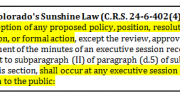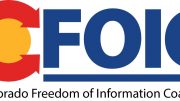By Jeffrey A. Roberts
CFOIC Executive Director
The Colorado Court of Appeals on Thursday ordered the dismissal of a libel case against the Arvada Press because plaintiff Jeffco Kids First failed to show “actual malice” by the newspaper or that statements made in an article by reporter Rylee Dunn “were materially false.”
A Jefferson County District Court judge erred by not granting the Arvada Press’ special motion to dismiss the lawsuit under Colorado’s anti-SLAPP statute, the appellate judges concluded.
That law created an expedited process for dismissing civil actions, known as Strategic Lawsuits Against Public Participation, filed against people or news organizations for exercising their First Amendment rights about matters of public interest. A court can be asked to rule on whether the plaintiff has established “a reasonable likelihood” of prevailing on a defamation claim, potentially halting the case before the expenses of the discovery process are incurred.

The suit brought by Lindsay Datko, who runs the Jeffco Kids First education advocacy group, alleged that an October 2022 article by Dunn “falsely stated that Datko and Jeffco Kids First wanted students to spy on their peers” to show that students in the Jefferson County School District were dressing up as “furries” and acting likes animals.
The newspaper “also falsely reported that they thoroughly verified the story and tried to contact Datko and other members of Jeffco Kids First multiple times, with no response,” Datko claimed.
The dispute centered on a Facebook post made by Datko after Republican gubernatorial candidate Heidi Ganahl claimed during the 2022 campaign that kids dressing as furries was “happening all over Colorado and the schools are tolerating it.” In response to media questions about the claim, Datko asked Jeffco Kids First Facebook followers if “any of your kids would be willing to record anonymous audio of their experiences with furries hissing, barking, clawing, chasing and how it affects their school day.”
Dunn in her article wrote that “Datko urged the nearly 6,000 members of Jeffco Kids First to have their kids secretly record their classmates.” She also wrote that “[n]either Datko nor Ganahl responded to Colorado Community Media’s requests for interviews about the Facebook group’s activities.”
The Arvada Press declined Datko’s request for a retraction and instead published an editor’s note with the article that included her clarification that she had sought “anonymous verbal statements from children.” The note said that screenshots from Jeffco Kids First show she had urged the group’s members to have their children secretly record their classmates.
The Court of Appeals in an opinion written by Judge Melissa Meirink noted that when a statement involves a public figure or a matter of public concern the plaintiff in a defamation claim “must prove by clear and convincing evidence that the statement was materially false and that the speaker published the statement with actual malice.”
While negative Twitter comments made by Dunn about Jeffco Kids First “may have evidenced Dunn’s hostility toward the plaintiffs,” those tweets do not establish actual malice “because they have no bearing on whether the challenged statements were false or published with a reckless disregard for their truth,” Meirink wrote. Instead, the appellate judges concluded, the statements in Dunn’s article challenged by Datko “were a rational interpretation of Datko’s September 2022 Facebook post.”
“Dunn’s article contained a screenshot of Datko’s actual Facebook post and the editor’s note expressing Datko’s disagreement with the defendants’ interpretation of her Facebook posting and setting forth Datko’s interpretation,” the opinion says. “Including this information counters any inkling of actual malice because it allows readers to come to their own conclusions about the post and challenged statements.”
The appellate judges also determined that Dunn had reached out to Datko and Jeffco Kids First leadership before the article’s publication, and “the plaintiffs failed to demonstrate a reasonable likelihood of proving, by clear and convincing evidence, that the statements were materially false.”
The Arvada Press and Dunn were represented in the lawsuit by media attorney Steve Zansberg, who is president of the Colorado Freedom of Information Coalition. The Court of Appeals ordered the district court to award reasonable attorney fees and court costs to the newspaper.
Follow the Colorado Freedom of Information Coalition on X or BlueSky. Like CFOIC’s Facebook page. Do you appreciate the information and resources provided by CFOIC? Please consider making a tax-deductible donation.




